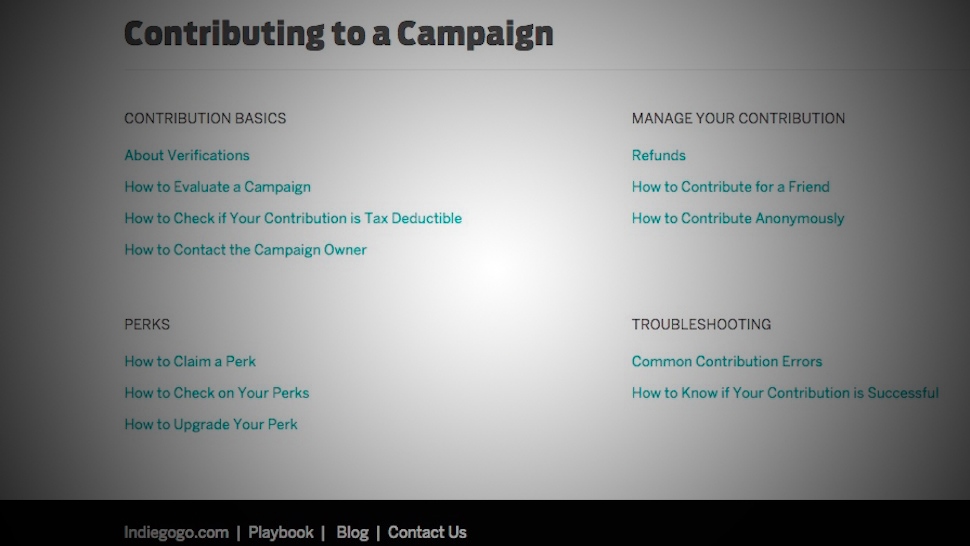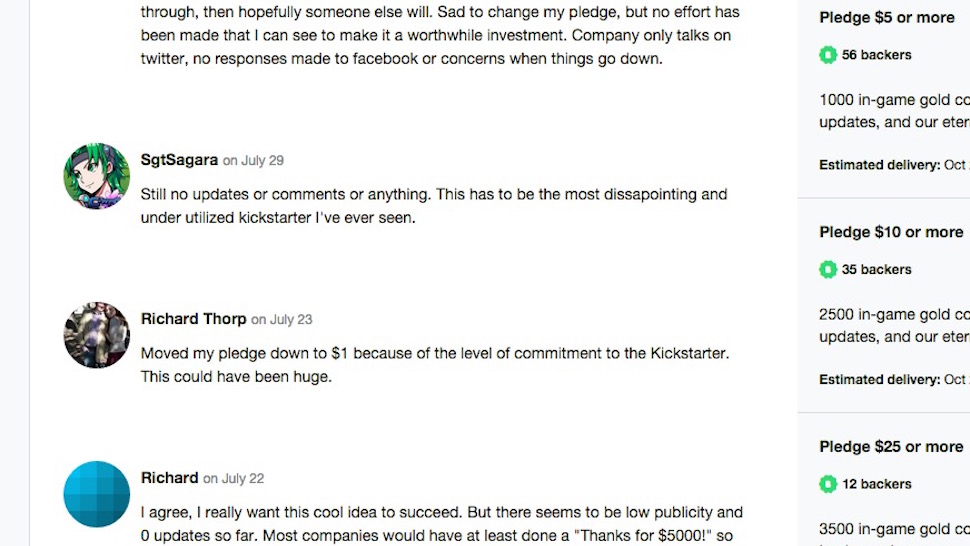Dear Lifehacker, I’ve seen a lot of Kickstarter campaigns lately that promise great rewards and have awesome ideas. Some of them are already fully funded, others need a little help. Is it safe to give them my money if they’re already funded? How can I tell if the end result is going to be as awesome as they promised? Thanks, GoFundYourself
Title photo by Tina Mailhot-Roberge. Additional photos by Toronto History, USDA, and Kletr (Shutterstock).
Dear GoFundYourself,
It’s a tricky question. While we’ve explained how to vet a Kickstarter project before you back it, all of the vetting in the world won’t change things if the project looks great on paper but turns out to be disappointing. In addition to making sure you do your homework before tossing your money in the pot, let’s talk about a few things to remember before you go wild backing Kickstarters or Indiegogos or other crowdfunded projects.
Remember: You’re Not Shopping, You’re Investing

Even those crowdfunding campaigns that are completely funded when you get to them may wind up crashing and burning by the time the money is all gone, so don’t assume that just because a project is overfunded by the time you see it, it’s bound for success. It’s easy to look at Kickstarter and the array of other crowdfunding sites on the web and feel like you’re going shopping when you browse their projects. In reality, that’s what those sites want you to think — they want you to check out the good-looking rewards and shiny campaign promo materials, and toss a few bucks in the hope that you’re going to get early access to an awesome new game, or a great new battery pack, or the next fitness tracker that will help you get in shape.
The problem with that mindset though is that you’re not shopping. You’re investing, and that comes with risks that aren’t necessarily obvious at first, although they should be. To their credit, none of the major crowdfunding sites like Kickstarter or Indiegogo pretend you’re doing anything different. They make it clear that you’re not ordering a product, you’re contributing money in the hopes that a product or service comes to life. Kickstarter is a little better at this by nature, since if a project isn’t funded, no money changes hands — but other sites offer flexible funding, where everyone who contributes is out the money, even if the project misses its goal. Either way, it’s a gamble, so remember: you should never gamble with money you’re not prepared to lose.
Read The Terms Before You Contribute

Crowdfunding sites are proliferating, and many of them have different rules and terms of use. Some, like Kickstarter, only take your money when a campaign has closed, and only then if the campaign was successful. Others hit your bank account right away, and take your money whether the funding goal is reached or not. Kickstarter, for example, doesn’t let you fund someone’s “lifestyle”, paying for their sustenance — which means that things like health care fundraisers or memorial funds can’t live on the site. Other sites are OK with that.
Wherever the campaign is hosted, make sure you read up on when your money will leave your pocket and when it will hit the bank account of the fund creator. Some people get angry when a campaign fails but they’re still out the money they chipped in — if that matters to you, make sure of it before you contribute and go in for the extra perks. Remember, giving $45 for extra perks like stickers, or your name in a short film’s credits, won’t make a difference if the campaign fails, the movie never gets made, and the creator just takes the money and walks away.
See What Everyone Else Is Saying Before You Contribute

You should check the web before you contribute. A catchy promo video, a good looking prototype, and a fully-backed project with money to spare is no excuse for not doing a couple of Google searches to see if major publications have highlighted the Kickstarter you’re thinking about funding. Equally important, you can see if the campaign looks great and has tons of money, but no one is talking about it. That should also be a cause for concern.
We’ve mentioned before that looking up the people behind a project is a good way to start your research — you can learn if they have the right backgrounds and skills to make the ideas they’re pitching a reality. If you find there’s a lot of buzz about the campaign, or if you — like me — usually discover great campaigns because some other website talks about them, some of this may already be done for you. However, it’s important to keep digging. One video game blog may talk about a campaign as the next great platformer, but another may notice that the people involved were also involved in a dozen failed campaigns in the past, and may not be quite so trustworthy with your investment dollars.
Don’t Be Afraid To Change Your Donation Level

Every crowdfunding platform allows the creators of the campaign to keep in touch with their investors by publishing updates or posting notices to the campaign page. Make sure you read those updates — preferably before you contribute (if the updates are closed and only visible to backers, that should be a red flag.) You can see the type of tone they take with their investors, how they’re currently spending the money, what information they’re giving out about the project, and most importantly, you can see how committed they are and regularly they communicate with their investors. You don’t want to back a project that’s been up for 20 days with no updates from the people behind it.
Some campaigns launch to huge fanfare and praise, but as the team behind it realises exactly how much work is required to make their idea a reality, they may bail on it. Don’t toss your money in after they have left the building. For example, previously mentioned FitRPG, a great app for gamifying your Fitbit, launched a Kickstarter shortly after their app launched to add new features to the app. Riding a wave of popularity, the Kickstarter began racking up money, but after a week or so, the developers behind the app mysteriously vanished. The app stopped getting updates, the Twitter stream went silent, and while the app still works, it has bugs and issues that remain unfixed. Where the developers went is anyone’s guess, but a quick look at the comments page shows a number of backers who caught wind that things weren’t going well and reduced their pledges from whatever dollar amount they initially promised to the $1 level because they were worried the project wasn’t going anywhere.
If you find yourself having already backed a Kickstarter — or any campaign — that seems to be going south, remember you can always adjust your pledge amount down to the lowest tier. You’re still out for that money, but it won’t hurt so much, and if everyone else ends up doing the same the campaign will fail, so no one gets any money. Then the founders are free to get their act together and try again later.
Don’t Expect The World

When Adam Dachis and I talked about crowdfunding on a recent episode of Supercharged, we pointed out that it’s inevitable many splashy campaigns will finish with disappointing results. There are just too many campaigns out there, and too many people trying to get rich quick. Even successful projects, like the much hyped Ouya, for example, wound up being a pretty big disappointment after launch. To be fair, the Ouya in’t bad, per se. It’s useful for lots of things, but it’s not the shining future of game consoles that backers initially hoped.
Keep in mind that all of the promo materials, the extra backer gifts, the shiny perks — -all of it is designed to make you contribute your money, and at the end of the day, the result of the project will be what it will be. You need to be prepared for disappointment even if you have high hopes for the campaign. That awesome looking video game may play terribly and wind up being less fun than it looked in GIFs and video, and that shiny new sous vide temperature controller may only last six months before breaking down or needing to be repaired. Keep those things in mind when you put your money down. There’s no way to see into the future and make sure that a successful campaign’s product will be everything you hoped it would be — if it appears at all — so the best thing you can do is to try and stay off the hype train and be realistic.
Between those tips and our more detailed guide to vetting a project, you should be in good shape to make an educated decision before you put your money in the pot for something shiny you see on Kickstarter or Indiegogo.
Sure, it can be fun to support and back some of those projects, but don’t let artificial scarcity or shiny bonuses trick you into throwing your money into a bottomless pit. Invest wisely.
Cheers
Lifehacker
Got your own question you want to put to Lifehacker? Send it using our [contact text=”contact form”].

Comments
3 responses to “Ask LH: Should I Contribute To Crowdfunding Campaigns (Like Kickstarter?)”
I generally look at it in the light of awesomeness vs realism vs likeliness. Does it sound awesome? Is it realistic that this is possible? Is it likely this particular group of people actually have the skills to pull it off?
If it’s awesome, but the chances of it being done are realistically minimal, feel free to contribute as much as you’re happy to never see again, and then pre order if it actually comes to market successfully.
If it’s realistic and likely they’ll pull it all together, go for the reward goal where you get the product. But remember, it’s not guaranteed.
While I’ve given a little bit of money to a few kickstarters as I liked their idea, I’ve only actually gone for a reward tier on one. I have however gone and pre ordered a few successful products after their kickstarter. Yea it’s a little more money, but I know the product exists by this point and others are enjoying the real thing.
I don’t like saying you are investing in the product/company/production as it is closer to a donation than anything else. It is an odd concept which is why they use the term to ‘back’ the project. You are giving money with no investment in the company (you get nothing if they are wildly profitable) but have a set reward that you are getting based on how much you offer. It is closest to a pre-order, but of something that hasn’t been finished (or even started in some cases)
I’ve backed several projects on Kickstarter, including a home automation system and a 3D printer. I’ve received everything I’ve backed, but the company doesn’t usually fare too well afterwards, because a lot of them are relying on non-Kickstarter funding to make it to the end.
Pirate3D, who made the Buccaneer printer I backed (and have since received, more than 2 years after backing) only wanted to raise $100,000 for their project. They blew past that and raised $1.5m, but needed several rounds of VC funding to stay afloat, because you can’t design, build, certify and ship a 3D printer for that price (they wanted $400 per printer. That’s now jumped up to $1,200 or so). Now they’re going to release a statement some time this week on their future, and people are guessing it’s not going to be good news, meaning more than half of the people won’t get a printer or may get one, but with even more delays.
Another project I backed was the Ninja Sphere which raised $600,000 (though the KS page says $700,000, the difference was via bogus pledges). Their idea was ambitious but doable, plus they were a Sydney based team who had a successful Kickstarter in the past (the Ninja Block) so I backed them and received the two Spheres I backed. The company has since run out of money, with a fair whack of people not getting their reward. The CEO (who I met in person, as they flew me up to Sydney for their launch party because I helped out so much in the comments and forums) is currently trying to secure more funds, but we haven’t heard anything yet. They got a round or two of funding but the next lot fell through, so there was no more money left, even though they were all working for peanuts
So long story short, give ’em your money, but be smart about it. Have they had a KS before (like Pebble)? How much do they want? Research the ideas yourself and see if they make sense. Ninja Sphere has a sweet “no touch” gesture system on the top that actually works, and I was able to find the chip they used online. Also take what they claim with a grain of salt. A wallet that is super slim? Yep, that’s fine. A house robot that can converse in natural speech, guard your house at night and manage your life, frustration free? I’d steer clear of that.
Good luck, and don’t be disappointed if your money goes bye bye. Happens to everyone.
my two cents is obvious and i am surprised: just donate only what you can lose. i like contributing to indie textile producers – never a huge amount, usually 20 to 50 dollars. if they fail i lose a bit, but do nto feel terribly
My experiences have been generally good on Kickstarter (I’ve backed 8). There is only one project that’s totally ripped me off. It was Shadowfox design. Take a look at their page, as a warning. They only just made their funding goal. Then proceeded to make excuse after excuse for delays and failure to send backer perks. I think you needed to assess the people and their goals with a rational mind. There are definitely some dreamers and shysters out there who will fail to get their project done through either incompetence or malice. The other thing to remember is there are a lot of project that are just someone importing something from parts unknown which you can possibly buy yourself more cheaply and immediately.